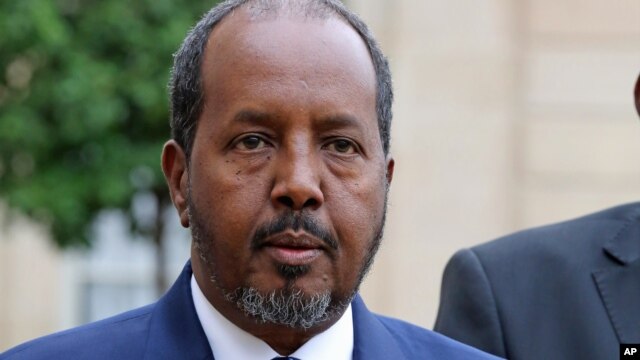
FILE - Somali President Hassan Sheikh Mohamud is seen in a Oct. 15, 2014, photo.
Somalia's president is urging Kenya to avoid drastic measures as it tries to stop cross-border attacks by al-Shabab.
President Hassan Sheikh Mohamud spoke exclusively to VOA Somali on Sunday, three days after al-Shabab gunmen massacred scores of students at Kenya's Garissa University College.
Mohamud objected to calls by some Kenyan politicians to deport all Somali refugees or to build a wall along the Kenyan-Somali border.
He rejected accusations the refugees, who mostly live in the Dadaab refugee camps, are responsible for insecurity in Kenya.
"That is not true, and whoever said that does not understand al-Shabab's culture," said Mohamud. "One of the gunmen [was] identified as the son of a Kenyan official and that is an example; he is not from the refugee camp nor Somalia. I do not believe there is a connection between Somali refugees living in Dadaab camps and terrorism activities."
The Somali president also said building a wall along the 680-kilometer-long border would be pointless.
"We are fighting against an ideology, not fighters or soldiers that have bases," he said. "A separation wall can not stop an ideology. The Kenyan government has not officially notified us about the plan, but if they do, we will share with them about our experience about that. We do not believe a wall can stop al-Shabab hostility."
The president expressed sadness at last Thursday's attack, in which al-Shabab gunmen stormed the Garissa campus and shot dead nearly 150 students before being killed by security forces.
The al-Qaida linked militant group said the attack was retaliation for the presence of Kenyan troops in Somalia. Mohamed rejected that assertion, calling it "propaganda." He said the Kenyan people and their leaders stand together in support of Somalia, and that Somalia appreciates that support.
Asked if his government is ready to hold talks with al-Shabab, the Somali president said his government has offered amnesty to militants. He said many fighters and leaders accepted that offer, adding that his government will continue to talk to anyone in al-Shabab who is willing to denounce violence. |
|
